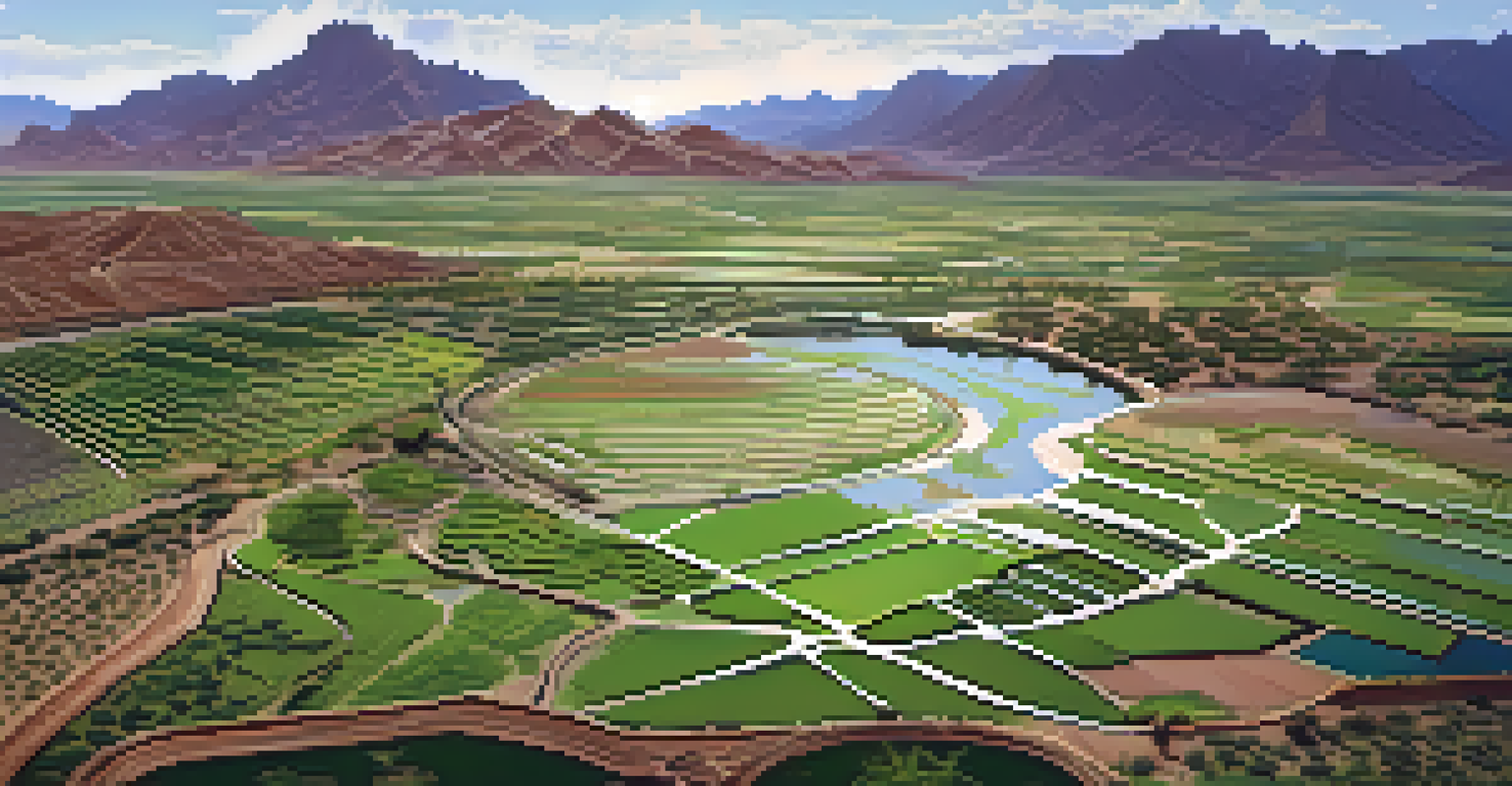The Role of Indigenous Practices in Managing Arizona's Climate

Understanding Indigenous Practices in Arizona
Indigenous practices in Arizona are deeply rooted in the region's history and culture. These methods have evolved over thousands of years, shaped by the unique landscapes and climates of the Southwest. From agriculture to water conservation, these practices reflect a profound understanding of the environment that has been passed down through generations.
We do not inherit the earth from our ancestors; we borrow it from our children.
For example, the Hopi people utilize dry farming techniques that allow them to grow corn and beans with minimal water. By planting in the right season and using traditional irrigation methods, they can thrive in an arid climate. This knowledge is critical today as we face increasing drought conditions and water scarcity.
Additionally, Indigenous practices often prioritize biodiversity and ecological balance. This holistic approach not only supports local ecosystems but also provides a sustainable way of living that can inform modern environmental strategies.
Traditional Ecological Knowledge (TEK) Explained
Traditional Ecological Knowledge, or TEK, refers to the understanding Indigenous peoples have about their natural environment. This knowledge encompasses species behavior, weather patterns, and land management techniques developed over generations. It’s an invaluable resource that contributes significantly to ecological sustainability.

An example of TEK in action is the controlled burning of land by Native American tribes. These prescribed burns help reduce the risk of larger wildfires by managing underbrush and promoting the growth of certain plants. This practice not only protects communities but also encourages the health of the ecosystem.
Indigenous Practices Enhance Sustainability
Traditional ecological knowledge from Indigenous communities offers valuable insights for sustainable practices and environmental management.
By integrating TEK with modern science, we can create more effective strategies for climate adaptation and resource management. This collaboration can lead to innovative solutions that benefit both the environment and local communities.
The Importance of Water Management
Water is a precious resource in Arizona, and Indigenous communities have long mastered its management. Traditional methods like creating check dams and using terracing help capture rainfall and minimize erosion. This sustainable approach ensures that water is available during dry spells, demonstrating a deep respect for this vital element.
The land is alive, and we have to respect it. We must take care of the land, and it will take care of us.
For instance, the Tohono O'odham Nation employs a system of floodwater harvesting that allows them to utilize seasonal rains effectively. By channeling water to their crops and natural reservoirs, they not only sustain their agricultural practices but also replenish local aquifers.
As climate change continues to impact water availability, these Indigenous methods present valuable lessons for modern water management strategies. Learning from these practices can lead to more resilient communities facing the challenges of our changing climate.
Cultural Significance of Land Stewardship
For Indigenous peoples, land stewardship is not just a practice; it's a cultural belief. The connection to the land informs their identity, spirituality, and community well-being. This relationship emphasizes the importance of taking care of the environment as a shared responsibility.
Many tribes engage in rituals and ceremonies that honor the land and its resources. These traditions reinforce the idea that nature is a living entity deserving of respect and care. By prioritizing ecological balance, Indigenous practices provide a model for sustainable living that can inspire broader societal changes.
Water Management is Essential
Indigenous water conservation techniques provide effective strategies for managing this precious resource amid climate change challenges.
Recognizing the cultural significance of land stewardship can foster greater appreciation for Indigenous practices. It highlights the need for a collaborative approach to environmental management that respects diverse perspectives and traditions.
Adapting Indigenous Practices for Modern Challenges
As Arizona faces increased climate challenges, adapting Indigenous practices can provide innovative solutions. These time-tested methods are not static; they can evolve to address contemporary issues such as climate change and resource depletion. By integrating traditional knowledge with modern science, we can create a more resilient future.
For example, urban areas can learn from Indigenous agricultural practices by implementing community gardens that utilize local plants and water-efficient techniques. This not only enhances local food security but also strengthens community ties and promotes ecological awareness.
Furthermore, engaging Indigenous communities in decision-making processes regarding land and resource management can lead to more effective and inclusive policies. This collaboration can bridge the gap between traditional knowledge and scientific research, helping to address modern environmental challenges.
Community Resilience and Indigenous Leadership
Indigenous leadership plays a crucial role in building community resilience against climate impacts. By fostering a sense of identity and cultural pride, Indigenous leaders empower their communities to take action in preserving their lands and traditions. This grassroots approach encourages collective responsibility for the environment.
In many cases, Indigenous communities are at the forefront of climate advocacy, highlighting the importance of their rights and practices in global discussions. Their unique perspectives can influence policy changes that promote sustainable practices on a larger scale.
Cultural Beliefs Shape Land Stewardship
The deep cultural connection Indigenous peoples have to their land reinforces the importance of stewardship and environmental respect.
As we look to the future, supporting Indigenous leadership is essential for nurturing resilience within communities. Their knowledge and experiences can guide effective responses to climate challenges, ensuring that traditional practices remain integral to environmental stewardship.
The Path Forward: Embracing Indigenous Wisdom
Embracing Indigenous wisdom is not only about recognizing historical practices, but it's also about applying these insights to contemporary challenges. By valuing Indigenous knowledge, we can enhance our understanding of sustainability and climate resilience. This shift in perspective is crucial as we strive to protect our environment for future generations.
Collaborative efforts between Indigenous communities and governmental agencies can facilitate the integration of traditional practices into modern environmental policies. This partnership can lead to more inclusive and effective solutions that honor the knowledge of those who have lived in harmony with the land for centuries.

Ultimately, the path forward involves a commitment to learning from Indigenous practices and incorporating them into our collective approach to climate management. By doing so, we not only honor their legacy but also pave the way for a more sustainable future.